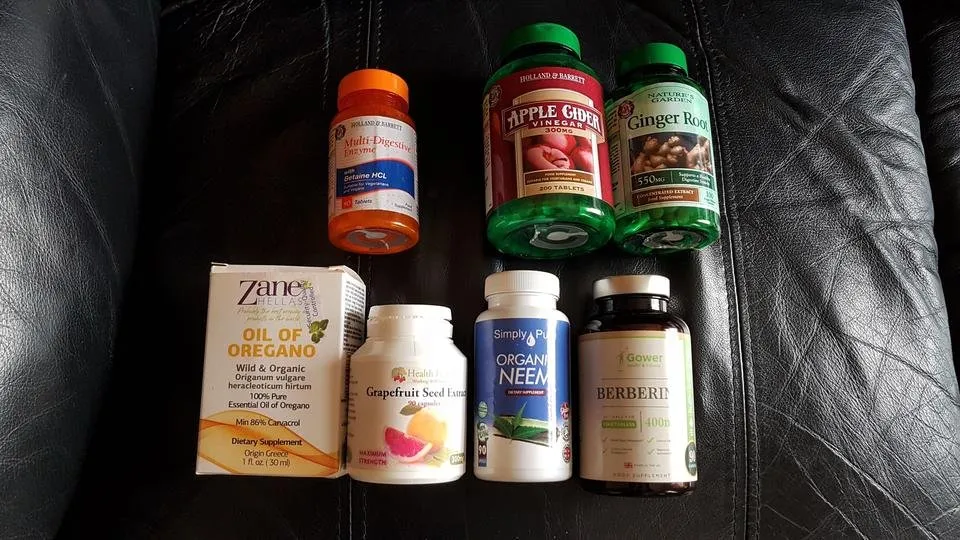
What is SIBO?
To put as simply as possible, SIBO stands for small intestinal Bacterial Overgrowth.
https://ipfs.busy.org/ipfs/QmVhRG55QmjNLQGHmX6fPmLHhzZDESHQs3a88dVBBiaBF1
Pic 1A large majority of the bacteria that make up the population of your gut microbiome live in the large intestine (colon). There are millions of bacteria throughout the length of the guts but the type and proportion vary based on the environment. For example there are relatively few in the stomach due to the high HCL (stomach acid) content and digestive enzymes called peptidases. Helicobacter pylori is an example of a bacteria which can live in the stomach and cause issues if it gains dominance but most of them are benign.
In the case of SIBO, everything has become unbalanced and a large amount of bacteria, both good and bad have migrated into the small intestine.
So, what to do about it? How to treat it? My experience with doctors and specialists.
Doctors are divided between the traditional medical community and the functional (holistic) doctors. The basic difference between the two is that traditional medical practitioners treat the symptoms and functional practitioners try to identify and treat the underlying cause. Most traditional doctors will prescribe various antibiotics for SIBO, with a view to killing the bacterial overgrowth. The problem is that this is only around 40% effective.
Over the last 6 years of treatment I've endured misdiagnosis (of IBS), unreasonable resistance to alternative treatment protocols, constant attempts by NHS specialists to sell the idea that SIBO is too complicated a condition to solve and over reliance on antibiotics.
Seriously, I've been through 6 courses of antibiotics in a 4 year period, all with no measurable improvement in my condition.
At the beginning of all this, before I'd convinced the specialist to give me the hydrogen breath test for SIBO, my GP said that "I needed to accept that this might be a medically unidentifiable condition." When I finally got a referral to see the Gastroenterologist (gut specialist) I spent a whole year battling him to give me the breath test as I was so sure it was SIBO. Guess what, after wasting a year of my life on pointless diets that I had told him I'd already tried in the past, he relented, gave me the breath test and it came back as positive for abnormal hydrogen levels in the small intestine. The indicator for SIBO.
All of this has caused a lot of stress and most gut issues are exasibated by stress through the
gut brain connection. I've spent a huge amount of my 'well time' researching possible answers/treatments on the internet while attempting to sift through the 'noise' on forums. It is not an acceptable statement to me as my late grandmother said "just to trust my doctor." In my case I've been proved right time and time again while being discouraged by traditional medical practitioners. This has led to me going through this critical research process, which has taken years as one of the symptoms in my case of SIBO is intermittent cognitive issues (severe brain fog).
On the other side of the coin, there is a huge money making machine behind the alternative treatment route as well, mainly in America. This does not make it easy to find an effective treatment as there are a lot of different functional doctors all pushing their own protocol. The irony is that these varied treatments are working... for some people.
The one thing I'm 100% sure about from reading hundreds of hours worth of anecdotal evidence on the net is that different treatments work for different people. This makes me err toward the theory of alternative practitioners that treating the symptoms without also treating the cause is counterproductive. This conclusion is based on the fact that there are different causes that trigger SIBO, therefor it seems logical to me that this is exemplified through the varying successes in treatment protocols from person to person.
I'm also sure that if the two fields of medicine, traditional and functional, would work together, they would find a resolution a lot faster.

Pic 2
Below I will out line the underlying causes, risk factors, symptoms (I will put the ones I suffer from in bold) and treatment options as simply as I can. With the causes of SIBO it is often the case that a combination of these factors are what led to the bacterial overgrowth in the first place.
Underlying Causes (triggers) of SIBO
Low gut motility - this basically means how quickly food is passed through your digestive system by the cleansing waves or migrating motor complex (MMC). In some SIBO sufferers this is very low and manifests as severe constipation.
Low stomach acid or the wrong blend of acids and enzymes - when they are out of balance damaging bacteria can pass through to the small intestine where they create colonies and multiply exponentially. An example of this could be streptococcus. Some experts believe that an aggressive invasion of strep into the small intestine might be the culprit in a lot of cases of SIBO.
Malfunctioning ileocecal valve - this is the valve between the small intestine and the colon (large intestine) located in the area know as the ilium (please check Pic 1 above). When the ileocecal valve malfunctions it can remain open for a time allowing bacteria to wash back into the small intestine creating an imbalance of bacterial load in the small intestine.
Previous serious cases of food poisoning - in some cases SIBO develops after serious bouts of food poisoning. Most of these cases can be effectively treated with either herbal antimicrobials or specific antibiotics if diagnosed early enough.
Risk Factors that Increase the Chance of Developing SIBO
- Crohn’s disease
- Prior bowel surgery
- Diabetes mellitus (type I and type II)
- Multiple courses of antibiotics
- Organ system dysfunction, such as liver cirrhosis, chronic pancreatitis, or renal failure
Common symptoms of SIBO include:
- Abdominal pain/discomfort
- Bloating and abdominal distention
- Diarrhea, Constipation or a variation of both
- Gas and belching
- Symptoms related to vitamin deficiencies
Less common symptoms of SIBO include:
- Severe nausea
- Chronic fatigue (due to nutritional malabsorption)
- Joint pain and general aches (related to nutritional malabsorption)
- Depression and anxiety
As you can see, I exhibit all but two of the symptoms. In my last breath test there were high levels of hydrogen detected in the small intestine and this was only a month after my final course of antibiotics.
Standard Treatment Options for SIBO
- Antibiotics - particularly rifaximin has been shown to be the most effective.
- Herbal antibiotics (antimicrobials) - there are a huge range of possible herbal options.
- The elemental diet - this is a diet that consists of macronutrients broken down into their elemental state requiring little to no digestive functionality which allows time for the gut to rest and starves the bacteria. The nutritional make up of most elemental formulas are 14-18% of calories from protein (in the form of amino acids), 42-76% calories from carbohydrate (in the form of monosaccharaides), 6-43% of calories from fat (in the form of fatty acids) and a full spectrum of vitamins/minerals.
I have been through the first two options in this list. As mentioned above, I've been given more than 6 courses of antibiotics (including rifaximin) in the last four years, and after the last course of antibiotics didn't work, I got really fed up and put myself into more debt buying over £100 worth of herbal products on amazon.

In the picture above: Concentrated Oil of Oragano, Neem, Berbarine and grapefruit seed extract (all herbal antimicrobials). Apple cider vinegar supplement (increases and encourages stomach acid balance). Digestive enzymes with HCL (increases and encourages stomach acid balance). And ginger root extract (a natural prokinetic - increases gut motility).
I took these for around 4 months with no noticeable improvement in symptoms. My most recent breath test showed an extremely high level of hydrogen in the small intestine and with reluctance the gastroenterologist agreed that more drastic treatment ($$$$-wise) was needed.
Thank you for sticking out this rather long post. I am aware that this may be information overload, so I'm going to split this blog into two parts. Tomorrow I will outline, in detail, the treatment I've just started. Be sure to check in tomorrow for...
The Elemental (Mental) Diet - Three Weeks Without Food

This post was written from memory, inspired by the insane amounts of research I've had to put in to this issue. I did have to fact check a few things to make sure that my memory wasn't failing on some of the science 😉 Please check the links listed below for further reading, where I confirmed my facts. All images are creative commons, linked to source below pics. Extra image used in the title picture is from pixabay.com and can be found here. If you have enjoyed this post, you can check out similar work on my homepage @raj808. Thank you.
Info on gut microbiome: https://gut.bmj.com/content/67/9/1716
Info on stomach bacterial make up: https://www.livescience.com/515-bacteria-thrive-hostile-human-bellies.html
Info on Ileocecal valve dysfunction in small intestinal bacterial overgrowth: https://www.ncbi.nlm.nih.gov/pmc/articles/PMC3520169/
Further reading on SIBO Symptoms: https://chriskresser.com/sibo-what-causes-it-and-why-its-so-hard-to-treat/


















